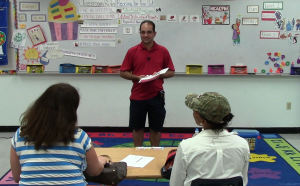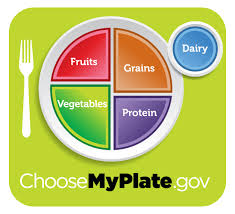School Readiness Parenting Program (SRPP)
Developed by Dr. Graziano the SRPP is an 8-week group based parenting program with sessions lasting between 1.5 to 2 hours. While the SRPP contains traditional aspects of behavioral management strategies (e.g., improving parenting skills and the parent-child relationship; discipline strategies such as time-out) that have historically been implemented in behavioral parent training programs, it aims to be a hybrid model in its delivery system combining elements from two well-established parent training models (COPE and PCIT).
The SRPP utilizes a large group format (15 parents) to receive initial didactic information on various skills but then breaks into subgroups of 3 parents for skill practice. During subgroup activities, parents practice their newly acquired skills with their own children while the other parents in the subgroup observe, record, and provide feedback on the parents’ performance. Parents rotate through actually practicing the skills and serving as the observers.
In this manner, parents are being trained in how to be the “therapist” in terms of knowing what to look for, providing feedback, and then trying the skill themselves. Another novel aspect of the SRPP is its inclusion of various school readiness topics including teaching parents about dialogic reading, homework time/routine, sleep/eating routines, promoting social-emotional skills, and communicating with teachers effectively.
See publication showing the effectiveness of SRPP (Graziano et al., 2018)

Parent-Child Interaction Therapy (PCIT)
Recruiting families! Check out the flyers below:
Behavioral parent-training (BPT) interventions are the treatment of choice for young children with behavioral problems with Parent-Child Interaction Therapy (PCIT) being among the most well-established. PCIT is a manualized parent-training intervention with extensive research demonstrating its efficacy and long-term maintenance in treating young children with disruptive behavior disorders.
With foundations in attachment and social learning theories, PCIT was designed to alter the pattern of parent-child interaction and thereby change child disruptive behavior. Treatment progresses through two distinct phases: Child-Directed Interaction (CDI) resembles traditional play therapy, and Parent-Directed Interaction (PDI) resembles clinical behavior therapy.
During CDI, parents follow their child’s lead in play by using the non-directive PRIDE (i.e., do skills): Praising the child, Reflecting the child’s statements, Imitating the child’s play, Describing the child’s behavior, and using Enjoyment. They learn to apply PRIDE skills to the child’s appropriate play and ignore undesirable behaviors, and are taught to avoid verbalizations that take the lead away from the child during the play (i.e., don’t skills), including questions, commands, and negative statements (e.g., criticism).

During PDI, parents set limits to reduce child noncompliance and negative behavior. They learn to use effective commands and consistently follow through with timeout for noncompliance. Parents are also taught variations of the PDI procedure to deal with aggressive behavior and public misbehavior. During all sessions, the therapist coaches each parent in vivo through a one-way mirror (using a wireless headset) in their use of the CDI and PDI skills with their child.
As a PCIT trainer, Dr. Graziano oversees a PCIT year round practicum for FIU's Professional Mental Health Counseling Program. Additionally, he trains doctoral students as well as other mental health providers in the community including therapists at the Lotus House (see projects section).
Lastly, Dr. Graziano has adapted PCIT to be delivered in a more condensed intensive version (I-PCIT) where families are seen 5 days/week over the course of 2 weeks. An open trial of I-PCIT has documented its feasibility and initial promise (Graziano et al., 2015) and we currently finished a comparative randomized trial where 60 young children and parents were assigned to receive either I-PCIT or the more traditional weekly PCIT model. Results across both mother report and observations showed that improvements in parenting skills, discipline practices, and children's behavior problems were comparable across treatment groups at both post-treatment and a 6-month follow-up. However, families who completed I-PCIT had better attendance and lower dropout rates compared to traditional PCIT.
Healthy-Lifestyle Parenting Program (HLPP)
The HLPP was originally developed by Dr. Graziano as part of the Healthy-lifestyle intervention program (HIP) which was delivered during the summer and targetted families of young children ages 4 to 8 identified as being overweight or obese.
Nutrition and Physical Health
Using an adapted stop-light system, parents learn to classify foods based on green or “go” foods such as fruits and vegetables, yellow or “slow” foods (e.g., pasta)., and red or “whoa” foods (e.g., cookies, soda). Sessions also address making small gradual changes, portion control, as well as implementing USDA’s MyPlate recommendations. Healthy substitutions are also addressed.
 .
. 
Behavioral Management Strategies
HLPP uses behavioral management and school readiness activities from the School Readiness Parenting Program (SRPP; Graziano et al., 2013) to target parenting skills and the parent-child relationship; discipline strategies such as time-out.
General Structure
The HLPP is intended to be administered to a large group of parents (12 to 18) with sessions lasting between 1.5 to 2 hours. An outline of each session structure is provided along with the objectives, materials necessary to run the session, handouts, as well as homework and tracking sheets. The first half of each session is focused on the nutritional content and utilizes a large group format to receive initial didactic information on various nutritional lessons. The second half focuses on mental health and while the large group may receive initial didactic information on various skills, they will also break into subgroups of 3 parents for skill practice. During subgroup activities, parents practice their newly acquired skills with their own children while the other parents in the subgroup observe, record, and provide feedback on the parents’ performance. Parents rotate through actually practicing the skills and serving as the observers. In this manner, parents are being trained in how to be the “therapist” in terms of knowing what to look for, providing feedback, and then trying the skill themselves. The therapist’s role during these subgroup activities is to help the parents who are observing as well as providing feedback to parents who are practicing their skills.
HLPP is designed to have 8 core sessions to maximize parental engagement and attendance. Prior to these 8 core sessions, families complete a 1 hour orientation session. Following the 8 core sessions, families have an option to participate in 4 additional booster sessions conducted on a monthly basis. To remove barriers to participation, child care is provided at each session along with food/refreshments.
The HIP program, which included a healthy-lifestyle summer camp, has been shown to be effective in improving children's health outcomes (Graziano et al., 2017)
